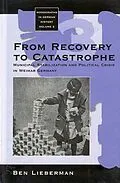Historians of the stabilization phase of Weimar Germany tend to identify German recovery after the First World War with the struggle to revise reparations and control hyperinflation. Focusing primarily on economic aspects is not sufficient, however, the author argues; the financial burden of recovery was only one of several major causes of reaction against the republic. Drawing on material from major German cities, he is able to trace the emergence of strong local activism and of comprehensive and functional policies of recovery on the municipal level which enjoyed broad political backing. Ironically, these same programs that created consensus also contained the potential for destabilization: they unleashed intense debate over the needs of the consumersand the purpose and extent of public spending, and with that of government intervention more generally, which accelerated the fragmentation of bourgeois politics, leading to the final destruction of the Weimar Republic.
Autorentext
Ben Lieberman teaches in the Department of Social Science at Fitchburg State College, Mass.
Inhalt
List of Tables
Abbreviations
Preface
Introduction: Recovering from Weimar Recovery
Chapter 1. Stabilization and State Expansion: Comprehensive City Planning
Chapter 2. State Expansion and Democratization
Chapter 3. Municipal Finance and Destabilization
Chapter 4. Cities and Distributional Conflict
Chapter 5. Cities and the Weimar Productivity Debate
Chapter 6. Defining the Civic Public
Chapter 7. State and Society: The Contradictions of Recovery
Conclusion: From Recovery to Destabilization
Sources and Select Bibliography
- Archival Sources
- Newspapers and Periodicals
- Select General Bibliography
Index
